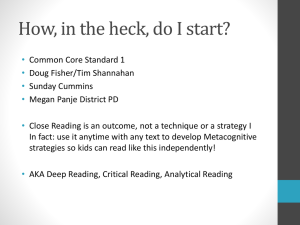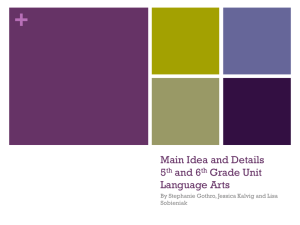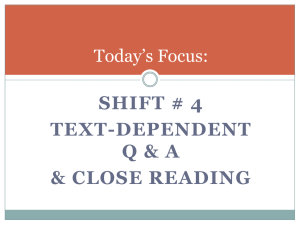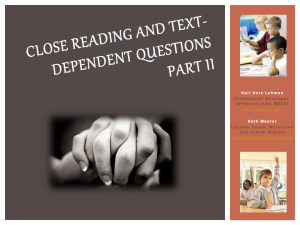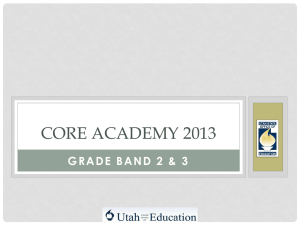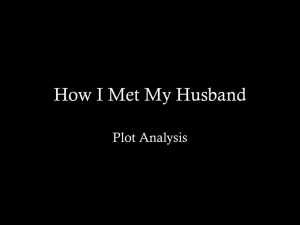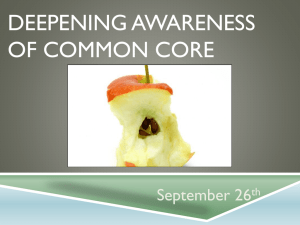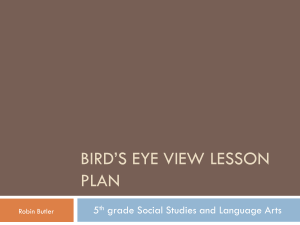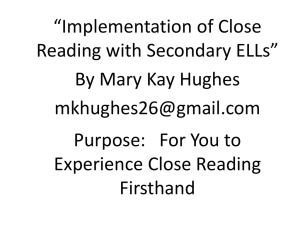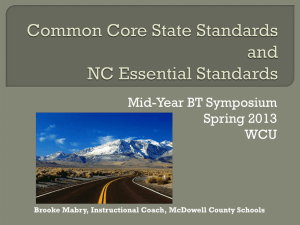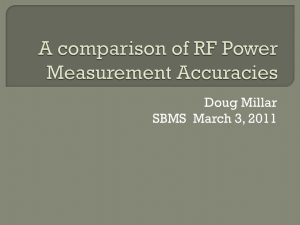Summer PD - TDQ
advertisement
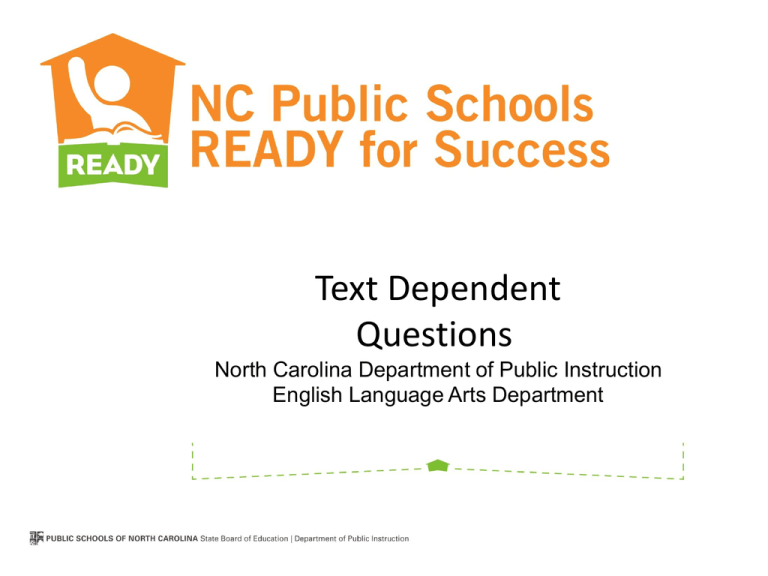
Text Dependent Questions North Carolina Department of Public Instruction English Language Arts Department Text-Dependent Questions and Evidence-Based Answers Participants will understand how to create text-dependent questions using a complex text. Defining Text-Dependent Questions by Christina Hank How does Christina Hank define text-dependent questions? How do we recognize a good text-dependent question? Why does Christina say we need to engage in a “different kind of planning”? How has Christina’s questioning changed? What Can a Small Bird Be? by the Character Education Teen Residency Project Participants Text-dependent Questions Demonstration The text begins with: There once was a curious bird who wondered, What can a small bird be? Why do you think the authors chose to begin the text with this question? Text-dependent Questions Demonstration What is the meaning of “courage” and how does Tortoise demonstrate “courage” in this text? Text-dependent Questions Demonstration What evidence is there that shows Bird is wondering, “What can a small bird be?” and working on a solution? Evidenced-Based Answers Text-based evidence facilitates rich and rigorous evidence-based discussions and writing through specific, thought-provoking questions about common texts (including, when applicable, illustrations, charts, diagrams, audio/visual, and media). Matching Activity Directions: Blue cards: Sort the QUESTIONS (blue cards) into two categories: examples and nonexamples. Non-examples Did you sort out these non-examples? Have you ever been bullied? The Bird says to Tortoise, “And you showed yourself, too.” Describe a time when you showed yourself you could do something. The Tortoise demonstrates courage with Bird’s help. Why is courage an important character trait to have? Red cards: Align the STANDARDS (red cards) with the QUESTIONS (blue cards). Question Standard(s) Addressed What does the word surfaced mean in this text? Why do you think the authors chose this word? L.6.4 Determine or clarify the meaning of unknown and multiple-meaning words or phrases based on grade 6 reading and content, choose flexibly from a range of strategies. a. Use context as a clue to the meaning of a word or phrase. The text begins with: There once was a curious bird who wondered, What can a small bird be? Why do you think the authors chose to begin the text with this question? RL.6.5 Analyze how a particular sentence, chapter, scene, or stanza fits into the overall structure of a text and contributes to the development of the theme, setting, or plot. What is the meaning of courage? How does Tortoise demonstrate courage in this text? RL.6.4 Determine the meaning of words and phrases as they are used in a text, including figurative and connotative meanings; analyze the impact of specific word choices on meaning and tone. RL.6.2 Determine a theme or central idea of a text and how it is conveyed through particular details; provide a summary of the text distinct from personal opinions or judgments. Question Standard(s) Addressed What evidence is there that shows Bird is wondering, “What can a small bird be?” and working on a solution? RL.6.3 Describe how a particular story’s or dramas plot unfolds in a series of episodes as well as how the characters respond or change as the plot moves toward a resolution. What evidence shows that the crows are bullying the Tortoise? What is Bird’s response? RL.6.1 Cite textual evidence to support analysis of what the text says explicitly as well as inferences drawn from the text. What words or phrases does the author choose to persuade you that the crows are bullies? RL.6.5 Analyze how a particular sentence, chapter, scene, or stanza fits into the overall structure of a text and contributes to the development of the theme, setting, or plot. Let’s Practice Creating Text-Dependent Questions Sample Text-Dependent Questions Question Type Questions from Frog and Toad Together (Lobel, 1997) – 1st grade Questions from Chapter 10 in A Night to Remember (Lord, 1955) – 6th grade General Understandings Retell the story using first, next, then, and finally. Why would the author title the chapter “Go Away”? Key Details What ways did they try to solve the problem of eating too many cookies? What are two things that could have prevented this tragedy? Vocabulary and Text Structure How did the author help us to understand what willpower means? How does the chronological structure help the reader understand the events? Author’s Purpose Who tells the story? Whose story is most represented and whose story is underrepresented? Inferences Do you think Toad’s actions caused the seeds to grow? Why would Mrs. Brown run lifeboat number 6 with a revolver? Opinions, Arguments, Intertextual Connections In your opinion, is Frog a good friend to Toad? Do you think this is a happy story or a sad one? Compare this book with [Ken Marschall’s] Inside the Titanic. What are the similarities and differences?
